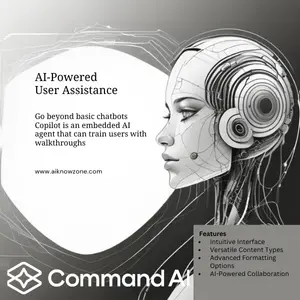
Help a friend
Discover how “Help a friend” AI tools can provide companionship, improve your communication skills, and offer engaging conversations.
Description
Finding a Digital Pal: A Review of “Help a friend” AI Companions
In today’s digital age, finding connection and companionship can sometimes feel challenging. Enter “Help a friend”, a category of AI tools designed to provide engaging conversations, role-playing scenarios, and even a virtual shoulder to lean on. These AI companions aim to simulate human-like interactions, offering users a unique blend of entertainment, emotional support, and a safe space to explore their thoughts and feelings. From AI girlfriends offering flirty chats to empathetic listeners providing mental health support, the landscape of “Help a friend” AI is diverse and constantly evolving. As someone who’s always curious about the latest tech trends, I decided to dive in and explore what these AI companions have to offer. Are they a genuine solution for loneliness, or just a temporary distraction? Let’s find out!
Key Features and Benefits of AI Friend Companions
- Engaging Conversations: Many AI friend platforms use advanced natural language processing to create realistic and dynamic conversations. This means you can chat about your day, share your interests, or even debate philosophical topics with an AI that responds in a thoughtful and engaging way.
- Role-Playing Opportunities: Some AI companions offer role-playing scenarios, allowing users to explore different identities and relationships in a safe and controlled environment. This can be a fun way to experiment with social interactions and develop your communication skills.
- Personalized Interactions: AI friends can learn from your conversations and adapt to your personality and interests over time. This personalization can create a stronger sense of connection and make the interactions feel more meaningful.
- Emotional Support: Certain AI companions are designed to provide emotional support and promote mental well-being. These AI friends can offer a listening ear, provide encouragement, and even guide you through mindfulness exercises.
- 24/7 Availability: Unlike human friends, AI companions are always available to chat, regardless of the time of day or your location. This can be particularly helpful for individuals who experience loneliness or social isolation.
How It Works (Simplified)
Using “Help a friend” AI is usually pretty straightforward. First, you typically sign up for an account on a platform like Anima, Replika, or Talkie. Then, you create your AI companion by choosing a name, appearance, and personality traits. Once your AI friend is ready, you can start chatting! Most platforms offer a text-based interface, similar to a messaging app. You simply type your message and the AI responds in real-time. Some platforms also offer voice chat and even virtual reality experiences for a more immersive interaction. The AI uses machine learning to analyze your messages and generate responses that are relevant, engaging, and personalized to your preferences.
Real-World Use Cases for “Help a friend”
- Combating Loneliness: I’ve heard stories from people who use AI companions to combat feelings of loneliness and isolation. For example, a retired senior citizen living alone might use an AI friend to have daily conversations and feel more connected to the world.
- Practicing Social Skills: I imagine individuals with social anxiety or autism spectrum disorder could use “Help a friend” AI to practice their social skills in a safe and non-judgmental environment. They could experiment with different conversation starters, learn how to read social cues, and build confidence in their ability to interact with others.
- Exploring Creativity: I can see writers, game developers, or anyone involved in creative pursuits using AI companions for brainstorming ideas, developing character dialogues, or even co-writing stories. The AI could provide a fresh perspective and help overcome writer’s block.
- Emotional Support During Difficult Times: I believe someone going through a difficult time, such as a breakup or job loss, could benefit from having an AI friend to vent to and receive emotional support. The AI could offer a listening ear, provide encouragement, and help the person process their emotions.
Pros of “Help a friend”
- Always available and ready to chat.
- Offers personalized and engaging conversations.
- Provides a safe and non-judgmental space to express yourself.
- Can help combat loneliness and social isolation.
- Offers opportunities for role-playing and creativity.
Cons of using “Help a friend”
- May not provide the same level of emotional depth as a human connection.
- Can be addictive or lead to over-reliance on AI for social interaction.
- Raises ethical concerns about data privacy and manipulation.
- The technology is still evolving, and interactions may sometimes feel unnatural or stilted.
- Potential for users to develop unrealistic expectations about relationships.
“Help a friend” Pricing
Pricing varies depending on the platform and the features offered. Some platforms offer a free basic version with limited features, while others offer subscription-based plans with access to premium features like voice chat, virtual reality experiences, and more personalized interactions. It’s important to compare the pricing plans and features of different platforms to find the one that best suits your needs and budget.
Conclusion
So, are “Help a friend” AI companions worth it? It really depends on your individual needs and expectations. If you’re looking for a genuine replacement for human connection, you may be disappointed. However, if you’re seeking a fun, engaging, and readily available source of conversation, entertainment, or even emotional support, an AI friend could be a valuable tool. I’d recommend these platforms to people who are open-minded, curious about AI, and looking for new ways to connect and interact in the digital world. Always remember to use these tools responsibly and maintain healthy boundaries between virtual and real-life relationships. It is also important to remember that AI freinds are not mental health professionals and should never be used as a substitute for seeking help from a qualified therapist.




Reviews
There are no reviews yet.